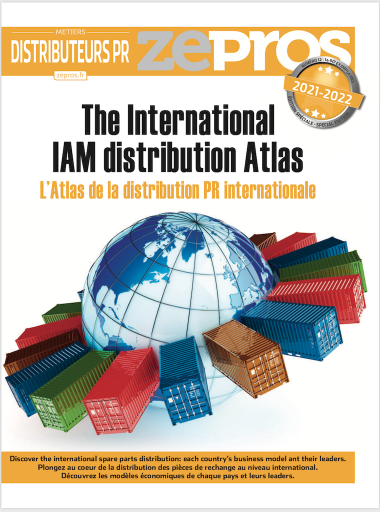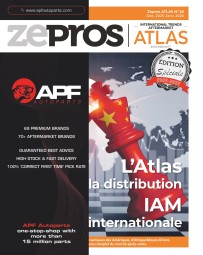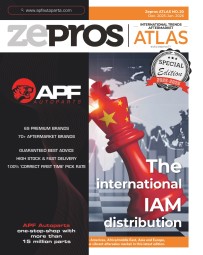
[Atlas] Back on a route to growth for Parts Holding Europe
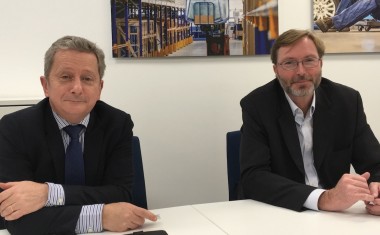
After "saving" 2020 doing "whatever it cost" to carry on delivering to the repair shops who remained afloat, the number three in European parts distribution is showing good growth in 2021. Stéphane Antiglio, president of PHE, and Jérémy de Brabant, CEO of BtoB, take stock and discuss the complicated outlook for 2022, shaken by shortages and changes still to come.
Are you going to reach the symbolic milestone of €2 billion in the 2021 accounts?
Jérémy de Brabant: We are much more interested in where we are heading than in snapshots. We have resumed the pace of growth of previous years. We also have a constantly growing EBITDA. And we are happy to see Autodistribution independent distributors and our subsidiaries share in this positive trend with strong organic growth.
Stéphane Antiglio: Our philosophy is to reinvest our profits in the growth of the group. In particular, we resumed our external growth by acquiring two Spanish companies in July and September. Annualising their turnover, PHE would indeed pass the symbolic €2 billion mark.
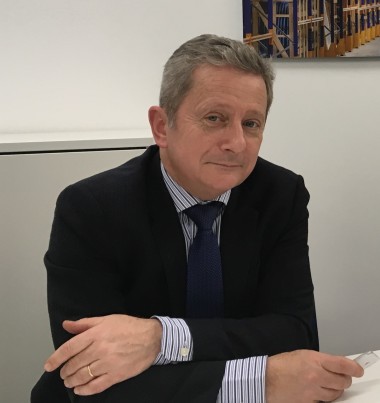
What financial options does PHE have after abandoning your recent IPO?
S.A: All options remain on the table. The change of shareholder will happen one day, which is the very nature of our journey with Bain Capital. But our role is to make sure that it is a non-event for the teams and the customers. Our job is to be an excellent distributor, regardless of the shareholder.
Have you seen aftermarket resilience in all the markets you are present?
S.A: Almost. PHE and many of the ADI members are emerging stronger from this crisis. We didn’t hesitate in investing by building up our stocks. Even in 2020, when cash flow was tight. We have continued to do this in 2021 to ensure parts availability for our customers. We all maintained our workforce, because we believed the business would come back. The market is resilient and proved to be so. The culture of our companies is to spend these difficult moments with our teams. Some members of ADI, including PHE, have maintained their programme of investment, opening new locations, innovating and renovating. When the upturn kicked in, we were ready to bounce back.
Paradoxically, the period is encouraging for our activities. The fundamentals of our after-sales activities were strengthened by the crisis in the end. Vehicle sales have been falling for two years, contributing to the aging of the fleet. In addition, there is a need for greater individual mobility, because of health concerns related to travelling on public transport or new uses such as carsharing. Consumer reluctance to go all-electric is also to our advantage. Those in the independent aftermarket have some very good years ahead of them.
Has state support for the economy been a lifesaver everywhere?
S.A: Governments fulfilled their role, sometimes with different methodologies and a different intensity to France, but overall it worked. This aid allowed us to overcome this difficult period in all the countries where we are operate. But companies that were already weak before the crisis have failed or will not succeed in getting through this phase. There will be local reorganisations based on competitive pressures, opportunities to gain market share will present themselves. In terms of external growth, we are focusing on companies in good financial health.
From an organic standpoint, small local opportunities that were more operational than strategic arose. This was the case in Catalonia following the liquidation of a competitor. We took on some of the employees, which meant we could open two new sales outlets in the region. That is another way to come out of the crisis a little stronger. And we are not the only ones.
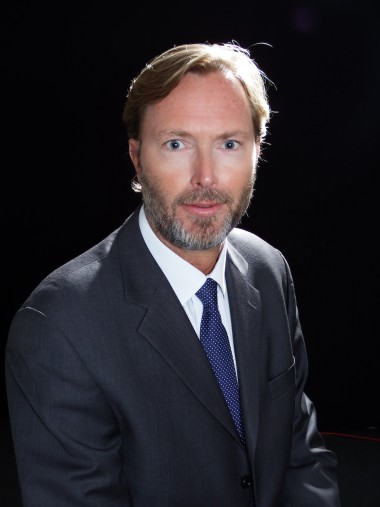
Are raw material shortages and supply disruptions from parts manufacturers already hampering your business?
J. de B .: We haven’t yet had to put an emergency plan in place, but we are proactive on a daily basis to avoid disruptions. Since the beginning of the crisis, our maxim has been availability first. Does this protect us from all the references or sub-segments suffering a setback? Maybe not completely, but we make sure that at all stages of the logistics chain, the risk is as low as possible. Where possible, we are proactive, and our suppliers know that we will be careful about the quantity of stock to ensure the availability of parts for garages. And so far, we haven't had to go looking for "relief" suppliers.
S.A.: We are also aware of the difficulties our parts supplier partners are facing. We understand the impact of cancellations of OE orders on their production, and shortages of raw materials. We must take account of industrial strategies that go beyond the simple framework of IAM. We try to see their point of view as much as possible. We are aware that all our upstream partners are making efforts! Overall, our panel of suppliers now ensure we can meet customer demand.
Could price rises resulting from shortages have some advantages in terms of margins?
J. de B .: No, inflation is never a good thing. Because on these issues of pricing and pressures between supply and demand, at the end of the day, car drivers need to be able to stay on the road and have their cars repaired.
S. A .: Inflation also increases costs for our distributors in terms of packaging, diesel, electricity and so on. It also affects wages because our social policy is always to ensure that employees’ purchasing power is maintained.
Does PHE's logistics footprint still need to be optimised? What are your priorities in this area?
J. de B .: Our growth wherever we are present creates opportunities and means we need to develop our logistics organisation, which we are constantly restructuring. We have several platforms in France and in neighbouring countries. But obviously in countries where we are present nationwide like Spain and Italy, we will have to adapt our logistics in an agile and pragmatic way. Logisteo was part of our success in France, but this model is not necessarily transferable to other countries.
S. A .: Logistics is certainly a cost that we are trying to optimise, but is also a way to improve customer service. We have professional teams of logisticians who work every day looking for continuous improvement and with an obsession to always improve service, at the best cost.
Is Oscaro in Germany a bridgehead for PHE?
S. A .: You have to disconnect two things. On one hand, the BtoB activity, for example Autodistribution in France, with next hour or next day delivery to garages based on physical logistics networks. But, for BtoB, we have nothing in Germany. Online activity with its BtoC target of DIYers, different delivery times and postal deliveries make it possible to quickly become, if not international, at least European. The Oscaro online dealer, already present in France, Portugal, Spain, and French-speaking Belgium, is doing a good job in expanding its scope.
Do you have a strategic European stake in the bodywork business?
J. de B.: We have a bodywork activity in Benelux called Geevers. In northern Italy, we have FGL which is also specialised in the market. We are interested in the bodywork business. This sector was hit harder by the crisis than mechanical and is bouncing back well. So, we will look at opportunities that arise, both organically and as acquisitions.
Where are you with your tyre business?
S. A .: In France, we listened to our garage owners who wanted Autodistribution to be a credible tyre partner so we put in place a supply dynamic. The first results are relatively modest at the market level. That means we have good development potential. In Spain, our subsidiaries have a sustained activity. In Italy and Benelux, the market structure means that there is no demand from our partners in parts distribution.
Is the proliferation of data and access to it still a challenge for IAM?
S. A .: We trust the European regulatory bodies. I remain positive on the topic of access to data, because our federations are working to make legislators aware of the need for fair competition. Beyond access to data is the question of the growing costs of automotive after-sales. The more advanced the technologies, the more expensive maintenance becomes and access to mobility becomes more complex. We are very sensitive to this question because we are campaigning for affordable mobility, accessible to all. Mobility is a factor of economic growth.
Are you concerned about the technological progression of vehicles?
S. A .: The race for better technology is a fact. We can ask ourselves about the cost / benefit of some equipment. Are they all essential? Will they become dangerous to drivers if they are not well maintained? Should they be included in MOT tests? We should be asking ourselves these questions. This move upmarket in vehicle technology increases the price of the new vehicle. A study by the PFA (the leading French automotive professional body) has shown that the components of an electric vehicle represent a 58% increase in value compared to an ICE vehicle, which will inevitably lead to an increase in the cost of repairs and maintenance. This is a concern for us because a growing gap is emerging between an elitist vision of mobility and the economic reality of the mass of the population.
Is this elitist vision shared across all European markets?
S. A .: European Commissioner Thierry Breton underlined the problem of divergency on this point in the member countries, saying that it was not possible for everyone to progress at the same pace.
J. de B.: It is a reality in northern Europe but seems less of a political issue in Italy and Spain.
Interview by Jean-Marc Pierret and Caroline Ridet
